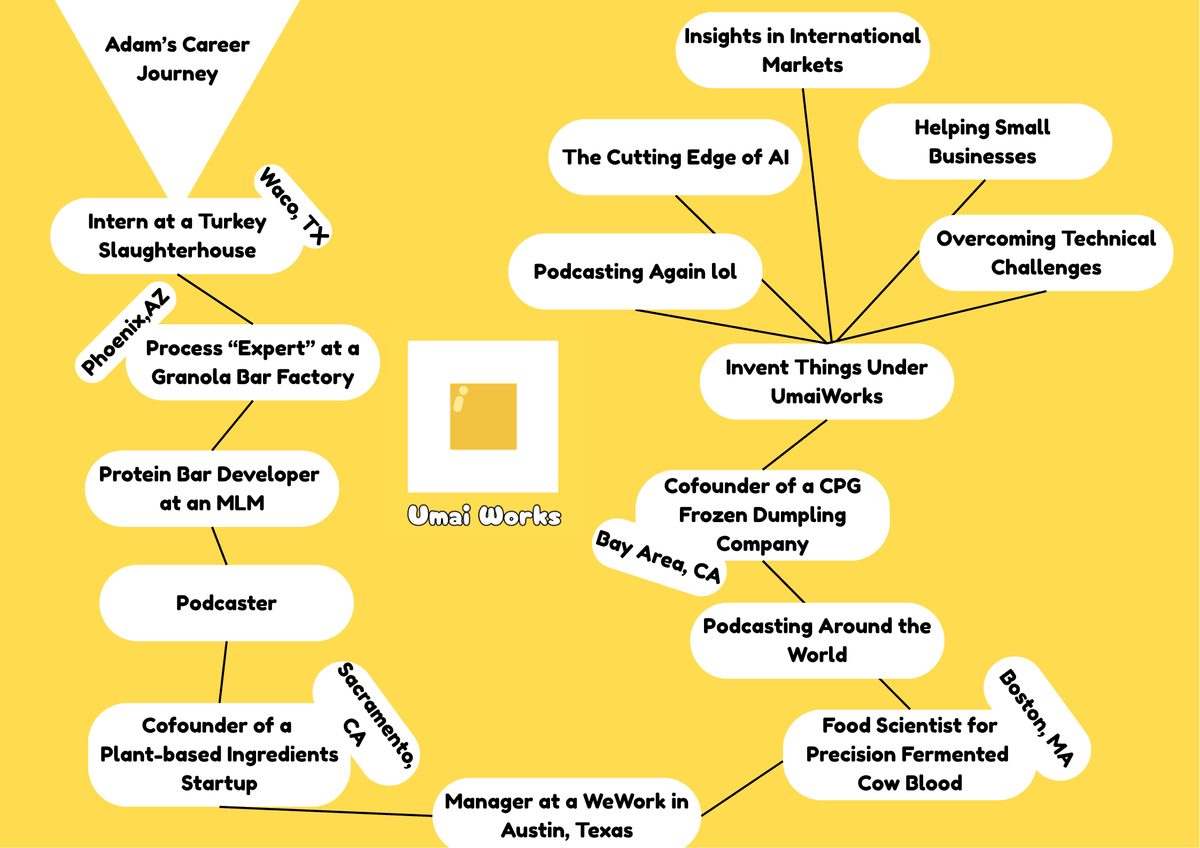
I’m playing with Canva, and I wanted to find a way to map out my career. As I made moves, I started to draw lines connecting the,m and then I moved those boxes with lines around until I got an image that looked like a dragon. The more I thought about it, it was more so a constellation. A beautiful picture where you might be able to state what it is. I thought career dragon would sound better, but I realize it wasn’t the right word. The dots on the board represent how I want to interpret it. A constellation.
Doing over 300 episodes of a career advice podcast, I listen to people’s stories weekly, and even my closest friends and coworkers have a story they tell me that I have no idea about.
Recently, I’ve had multiple inquiries where I had to explain myself, and there have been multiple times where people said I need to write this down. The stories I’ve had in my life could take like 8 hours to explain.
Scattered on LinkedIn posts, barely working websites, and podcasts are articles about my career journey, and I realized I haven’t talked about it in a very long time.
Everyone has a career journey, and I would say this is honestly an exercise in storytelling. I suggest everyone write about their story, whether in their journal or on their blog. It helps flesh out important details, expand your mind, and it’s also important to talk about your story intricately and definitively. I also think writing about your life allows you to appreciate how far you’ve come, which leads to a more fulfilling feeling
So this post is this: A snapshot of my career. Enjoy.
Also, this will most likely be a podcast interview with Jaime Tulley so it’s good to get my notes out.
Student - 2011-2014
I went to Cal Poly San Luis Obispo. I received a 4-year degree in food science, and I was annoyingly obsessed with extracurricular activities and being involved with the department. During the time there, I worked in the food safety lab, the pilot plant, and doing small R+D projects.
Specifically, I was obsessed with product development competitions where a team of 4-7 students would aggressively build a product. We were an undergraduate university that stumbled a few times but eventually got to the point where we could go toe-to-toe with Ivy League product development teams and, at one point, could beat them.
What I learned early on is that food product development is less about the actual food science and more about the variety of other things, and throughout my career, I’ve been on a quest to figure out what truly makes great products.
Internship at a Slaughterhouse 2023
My first internship was at a Cargill Slaughterhouse.
I applied through a career fair and Cargill took an interest. When you’re a student and use Wikipedia, you search Cargill and found out it was this impressive company that did everything.
However, I realized that it was the slaughterhouse department in Waco Texas.
I honestly hated it. Waco sucked; everything was hot, ugly, and I was super lonely. You would go into this slaughterhouse, where I just did a bunch of QA and R+D projects on deli meat, and go home and be bored.
The slaughterhouse we worked in was clean and efficient. 20,000 turkeys were slaughtered a day, with 60,000 slaughtered during the peak month of November. It was a well-oiled machine. They talked about implementing a skewering device that could use torquing to remove the guts of a turkey in one twisted cylinder. Next to that installation, there were about a dozen workers who were in the assembly line, wearing chainmail and sharp knives, cutting and ripping out organs. Makes sense.
The most scarring image I had in the slaughterhouse was seeing these fleshy whoopee cushions on the floor, and I asked what they were. Quite frankly, they said it was infected gizzards.
Glad I did it, but it also really convinced me just how wild the industry is. It’s probably the reason I found interest in finding a better way to replace meat.
First Job in Phoenix - 2014-2015

I leveraged the two job offers and got a better hourly rate because I hid that I had to work like a dog in the tomato plant. So I then moved to Phoenix.
This was a factory job where I had to wake up at 4 am, drive to the factory, start the line, and manage teenage rappers, teenage fathers, some retired people, a bunch of French Canadians, and some real stubborn management. The hardest working person there was a 50-year-old Hispanic lady named Hortencia who would lift 50 lbs of sugar and dump them into a 10-foot-tall vat of a molten maltose mixture.
I got a PIP in that job which kind of sucked, and I knew I had to get out. I was miserable, but found solace when I found mentorship with an entrepreneur who opened an artisan food shop. I paid him $5000 dollars for mentorship, and I found the framework he gave me to be worth i,t but I had a hard time adapting to it. Most people find me a better employee than an entrepreneur. They still do.
Second Job, Mentorship, And Podcasting 2015-2018
I got my second job at Isagenix. This was such a fun job. The switch from a hot and gray manufacturing plant to an air-conditioned, well-lit office room with a lab and attractive coworkers was great.
Isagenix is a multi-level marketing company that sold a weight loss dream. If you ate their shakes for 8 weeks, you’d lose weight. Their shakes were great. High protein, high fiber, filling, with the right blender and ice, you can make this delicious milkshake. Best of all, they were free for me.
The job was easy and also very rewarding. I loved the process of making products, and I push more and more to be involved.
If there’s one tangible lesson I learned in this part of the journey, it is the importance of a company sponsor. An advocate who will push your stupid ideas to the top. I made a name in the company because I had to deal with the founder’s son making a graveyard product, and I just worked hard to make this vegan bar that was pretty good. It launched, and it worked.
A new CTO joined the company and would have a lunch with every employee in the department, and we had an interesting discussion.
There was a serious protein bar project left over by the previous CTO in which I had to fly out to Montreal every other month with the new CTO to deal with a new co-packer. During our meetings, I saw corporate engagement in action and absorbed everything. But the biggest lesson is that dinners make the deals.
Over time, the CTO challenged me, and I delivered. I loved it. He would give me more responsibilities, have me be put in more meetings, and I built a notorious reputation as the “bar man”.
During this time, I also started a small side project called My Food Job Rocks. I’ve tried side hustles for a while because I absolutely hated my granola factory job. Though it started with spices, I then played with e-commerce and would buy pizza peels from China. I learned how to make a product, but I had no idea how to sell it. Desperate that I was burning money in an Amazon warehouse, I found a way to distribute free codes to people, but unfortunately, some pirates found the codes and stole all of my inventory. I lost about $10,000 bucks from this whole ordeal, which at the time was a huge amount of money for me, and I was devastated. I can laugh at this now, but it really shocked me.
After about a year traumatized by that, I found an article that talked about how the food industry was losing interest in software engineering because of this sexy, high-net-worth job. This is funny in hindsight, isn’t it? I reached out to the writer of this article, who was building her recruiting agency, FoodGrads, and we collaborated on a podcast called My Food Job Rocks. I would interview an expert in the food industry and post it every week using a $100 dollar mic, audacity and skype.
After a dozen episodes in, they decided to let me go. I took it and scrambled to build my own website and just kept on interviewing. I did it every week. It was just so interesting and people really liked it and I started to feel this creative agency in my life.
I had a healthy group of friends, was in a cover band, and explored the beautiful Arizona landscapes. It was such a good time. I had a trajectory for a stable life, and I think if I had stayed doing that, I would just be average. But I’m an idiot, and I don’t want an average life.
My First Company - 2018-2019
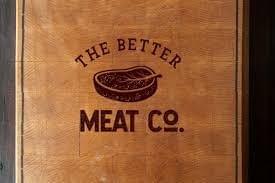
Over and over again, the guests I interviewed said that plant-based and cell-based meat was the future. Maybe a string of 20 guests kept on saying that. Articles about the burgers that bleed fascinated me.
At around episode 102, I interview Paul Shapiro, an animal activist who wrote a book called Clean Meat (meat not slaughtered from an animal). I was scared to have him on my podcast so I asked a past guest to ask him. I later learned Paul will talk to anyone so if you ever want to reach out to him, do it. The interview was very fun.
At the time, I was a lot better at managing and connecting with my guests, so I sent an email about Expo West and Paul reached out saying if I knew any food scientists who could help him with a project. I, being a gatekeeper, agreed, and he pitched me the idea of blending vegetables with meat.
I had some plant-protein experience so I took some material at Isagenix and made a savory blend and added to meat. I sent this powder to Paul who had his fiancé’s father eat it. It was approved, then he flew me out to San Francisco to get advice from Josh Tetrick, who basically said to focus.
And that’s how Better Meat Co was formed! I packed up this stable life at 25 to take a risk. But my calculations and forecasting told me the risk was worth it.
The factors:
1. Paul is well-known and knew how to raise money
2. This space was hot and the approach is unique
3. If I didn’t do it, I would regret it
This ended up being 2 years of building from nothing to something.
And maybe you’re like “wow 2 years? That’s nothing. You’re a quitter”
Yes, I am a quitter.
During that time, we raised $1.5 million, made a simple yet effective prototype, and through trial and error, were able to get Perdue Farms to rush a product using our ingredient. It took a year to develop a product that was able to launch in 7000 stores.
If you want to talk about impostor syndrome, then I’ll tell you this was the biggest. We were selling coated textured vegetable protein that had functional fibers and flavors. We had some asses comment that it was just that, but no one bothered to reverse engineer it. Paul actually went to a company and the product was just sitting there but that shitty bag of functional croutons was able to create Perdue Chicken Plus, a product in thousands of stores and still sells 7 years later.
I was later told it was just luck that this product actually worked. That we wouldn’t get another chance to pull something like that again.
Most product success is luck.
Better Meat Co decided to pivot to a more interesting technology so they could raise more money and I guess it worked.
I have my own opinions on this pivot, but at the time, I was hot-headed and, in hindsight, felt insignificant. So I left to pursue podcasting full-time. I am happy to be on good terms with Paul, Joanna, and even recently, Gus (the guy we onboarded as a cofounder for the mycelium tech).
Time heals all wounds.
Moving to Austin Texas - 2019-2020
Someone reached out, saying they liked my podcast, and it was the head of WeWork Food Labs. At the time, WeWork was the talk of the town and would almost IPO with a $47 billion valuation. Unfortunately, that didn’t happen but now I follow Scott Galloway religiously so that’s one good thing that came out of it.
I tried to get the San Francisco job, but was passed by someone else, but got a call later saying that the spot for Austin Texas was open (I later learned that the prospecting employee backed out because of all the WeWork drama). I said a big price to get me to move there, and they accepted.
I was there less than a year but I enjoyed it. My coworkers were awesome, loved going to New York and honestly, I freaking loved the ecosystem in Austin. It’s one of the friendliest and supportive CPG ecosystem I’ve ever been in and I still talk to some awesome people there.
But getting people in the space was hard, WeWork was going through some tough times and I lost more and more control as they shifted me around the building.
Then, the pandemic hit and I knew my days were numbered.
Pandemic and Boston - 2020-2022
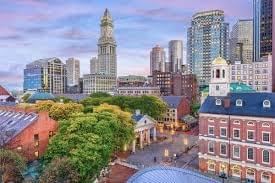
In Austin, I would be out 4 times a week to network. I loved it. Especially in my nice downtown apartment. I loved the city and getting around the city so much. The pandemic shut me in where I got cabin fever, played a lot of video games, and experimented with combining 2 Trader Joe’s items into one. During that time, I connected with my friends all over the world to play Dungeons and Dragons online with a bottle of wine in one hand, just having fun.
I didn’t mind quarantine.
Anyways, during that time I knew my days at WeWork were numbered. There was no way that a coworking space wouldn’t do layoffs during an indefinite shutdown. I reached out to a recruiter who asked me to help him find some people for Motif Foodworks (raised $345 million and failed). At the time, they were very secretive about what they were doing but I was so desperate for the job and tenaciously hounded Richard, my recruiter, about the role.
I had to talk to a lot of smart people to show them I was confident and competent, and I failed. Richard told me I was passed up to another experienced scientist. A week later, Richard told me that the scientist rejected the role because of the chaos in the pandemic.
But I thrive in chaos, and I understood the risk, and I knew that this was an opening to ask for more money. So I did, and I had a salary comparable to my dairy scientist counterpart, even though I feel like I didn’t have the credentials. The company is dead so I don’t care anymore about saying this.)
So during the pandemic, I moved to Boston without a car and knew absolutely no one.
But eventually, I found community. There was one guy who helped a lot. A Meetup host who just didn’t care. Crude, comedic, charismatic, Tal Ramoni (fun name) did these pandemic walks throughout Boston
He later became my roommate and found a great house paying $1000 a month because he was a real estate guy. It was awesome.
Anyways, Motif Foodworks was an interesting mix of startup and corporate. The two systems don’t mix. However, because we seem to have unlimited money, I got a crash course on how money can be used in good or bad ways.
I found my Motif coworkers to be amazing. We are brothers and sisters in arms, dealing with essentially corporate bullshit in a startup environment. I struggled there at first. I felt like I didn’t have the scientific competency compared to my colleagues who had PhD and leadership.
I’m not sure what changed. I think it’s when we were actually talking to customers that things just clicked.
During that time, I got the itch to be entrepreneurial again and was connected to my cofounder at Sobo Foods. I made prototypes in my kitchen and shipped them to New York from time to time.
Sabbatical Around the World - 2022
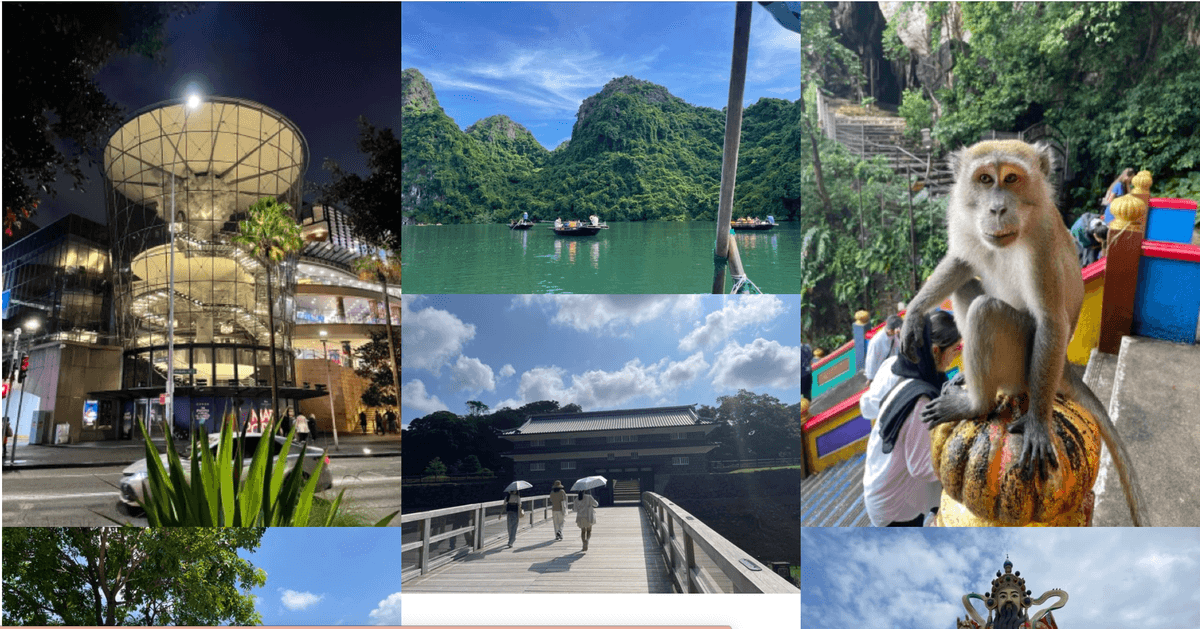
I didn’t really know how to meet people while traveling, so I thought of an idea. The podcast was on hiatus for a couple of years, and I thought it would be fun to interview the people I met in each country live on air. I would ask people on LinkedIn, or just people in my past to recommend me people to meet, and over time, had a great list. When I think in hindsight, those 3 months were a transformational period where I was able to pull my connections from the past to make friends that would last a lifetime.
Better Bite Ventures introduced me to Australian and South Korean entrepreneurs, Big Idea Ventures would let me hang out in their office in Singapore, The Spoon connected me with people from Japan in which I’ve established this amazing bond with, I met Malaysian colleagues that I’ve communicated with in the past, I crashed a Ha Long Bay boat tour in Vietnam with a food science colleague, my friend who I later because his best man at his wedding journeyed with me around South Korea, and I met an enchanting musician I’ve kept in touch with in Taiwan.
Of course, I saw the landmarks and they are seared into my mind, but the most valuable part about the trip was the various people who’ve woven into my life and has made it so enriching.
Sobo Foods - 2022-2024
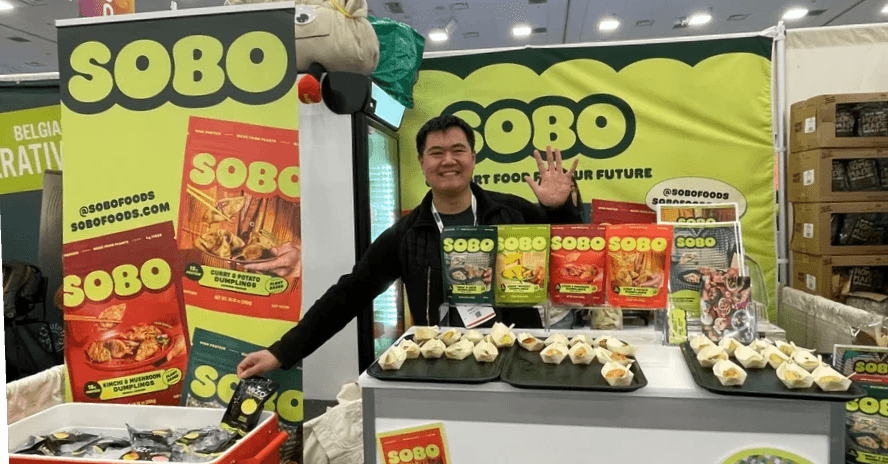
Making a food product is so easy, right? It’s just food. There’s a romantic feel of owning and selling a food you created and that was a romance I’ve always wanted to do. So I was able to convince another Asian American guy to go into CPG, go into retail, and focus on what I’m good at: making plant-based food. Specifically, we narrowed it to dumplings and we were fortunate to raise over a million dollars from friends, family, and investors and we were off to the races. Sobo Foods was born.
We did everything right for the whole two years I was in business. We executed a great product, a smart go-to-market plan by driving around to 100 customers, we scaled from a small retail ecosystem, to Fancy Food show, to Expo West, to KeHe/UNFI. I would say it was an expedited masterclass of scaling a CPG brand from 0-1. A million dollars helps. I could make mistakes, we could make production decisions such as buying a dumpling machine, and the way we got into a co-packer was an ideal situation. I just felt we did everything right, and then he fired me.
You can hear my sob story on LinkedIn but I’m over it. I have a lot or negative feelings about this but I was able to turn this into a business model where I help others. I am so grateful I was able to build a CPG company from scratch. With my recipes, my creativity, and not my own money.
Consulting and Umai Works - 2024-2025
A crisis generally leads to opportunity. It was a tough year, but I feel so much better now. I just started aggressively asking my friends for work. Some people, early on, gave me a chance. I was able to help Dina from Tochi understand flavors, I was able to teach Luiza from Unclassic Foods lessons from my startup, and a Rice Noodle Factory hired me to handle the FDA issues they were having. This security blanket allowed me to build up the ability to take more and more clients.
My model is unique and aggressive. They are 1-month stints to get entrepreneurs confident and ready for action. I do strong deliverables for 1 month straight for cheap, and it worked out. The quick iteration allowed me to thrive in chaos and build better and better systems for making great products. I love it because things are growing, they are getting better, and I am feeling more confident. I’ve found my biggest fear was not my incompetence technically, but that I really sucked at asking people for money. I made it a goal to ask for money often and get paid my worth. It’s one of the least talked about skills when it comes to anything in life but it allows me to control how much I work and validate my worth.
The best part is that I am combining all of my experiences in manufacturing, food tech, and consumer packaged goods to really help people succeed. The versatility and sympathy I have with my clients is really unique. I brought back the podcast to become a network and marketing engine, which allows me to interview smart people and share those interviews with potential clients so they know I’m legitimate.
And it’s not just pulling from past experiences, but the freedom has allowed me to do so many things. Publish my first research paper on AI with Stanford, get paid to speak in Japan, and visit my friends in Singapore for fun. It’s so amazing what’s happened this year. Connecting with friends, making new ones, and I’m slowly beginning to feel like I can do anything.
What’s next??? 2026
I’m going to do something I’ve always wanted to do. I have the time, the money, and the freedom to do it.
I mentioned it to a few people and they said ”are you crazy?”
I’ve heard that more than once in my life. I tell them I have a plan, and they are convinced.
More on that later.
